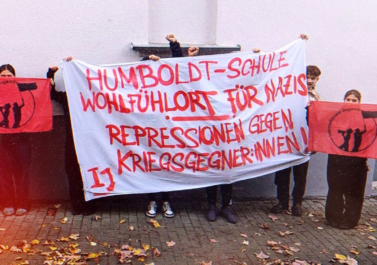
We publish a series of articles from the current issue no.113 of the German magazine Wildcat – they all relate to the current global moment. The following article relates to the general question of bloc confrontation, the next article will look at the decline of the US as a hegemonic power. Then we will read how all this relates to the change in the general energy regime and the so-called ‘green transition’. This is followed by an article on the current tendency towards wars and the affirmative relation of the mainstream political left towards wars. We conclude with a longer article about the ‘right-wing’ shift in Europe.
We also recommend reading the following related articles, if you haven’t already done so: ‘on the role of central banks’, ‘theses for a new anti-imperialism’, ‘on the capitalist wars’, ‘on the current moment’. We hope that these articles can provide some material for our day-to-day discussions, wherever we work, wherever we struggle.
In the 60s and 70s, many on the left tried to find a general political orientation in anti-imperialism. After Russia in 1917 and China in 1949 the ‘liberation movements in the Third World’, for example in Southern Africa, seemed to create a ‘red zone’ on the globe and to encircle the capitalist West. At the latest between 1989 (collapse of the Soviet Union) and 1994 (ANC takeover in South Africa), these hopes were dashed. Even today, parts of the left are still hoping to locate the forces that change the social balance of power on a world map. ‘Geopolitics’, the discussion about descending and ascending hegemons, has replaced the perspective of global class relations. This is characterised by ‘geo-determinism’ on the one hand and a focus on war on the other. A speaker at the Kennan Institute once wrote that the geopolitical view of the world is the view out of the window of a bomber.
The core of ‘globalisation’ was the worldwide access to labour. The decline of the USA can ultimately be traced back to the crisis in its industry. They are defending themselves against this with protectionism and bloc formation. As the leader of the Western bloc, however, they are in danger of failing because they can no longer combine or reconcile ‘foreign policy’ (reactions to global upheavals) and ‘domestic policy’. When Trump says publicly that he will not recognise the result of the November elections, then the West can hardly pretend to deliver democracy to the rest of the world.
In the dispute between the USA and China, the EU is in danger of being crushed. However, the opposing position is not ‘sovereignty’ and nationalism, but the global class struggle. The geopolitical power game does not offer any prospect of liberation. Relying on the ‘multipolar world order’ would be just as wrong as relying on the Soviet Union, Mao or the national liberation movements in the 1970s.
Things go down in May
On the 7th of May 1999, US fighter bombers dropped five two-tonne bombs on the Chinese embassy in Belgrade. Three Chinese journalists were killed and 20 people were injured. The UN Security Council did not condemn the attack; China abstained.
In 2010, Chinese Prime Minister Wen Jiabao criticised the western economic model at the World Economic Forum in Davos, saying it was ‘undisciplined, unsustainable and wrong’. In 2020, the total GDP of the BRICS group (Brazil, Russia, India, China, South Africa) reached that of the G7 (USA, FRG, France, Italy, Japan, Canada and the UK), measured in purchasing power. After Egypt, Ethiopia, Iran and the United Arab Emirates joined the BRICS at the beginning of 2024, a good 45 per cent of the world’s population now lives in nine BRICS states (in the G7 states around eleven per cent). They claim for themselves to represent the interests of the Global South.
On the 7th of May 2024, the 25th anniversary of the embassy bombing, Xi Jinping visited Belgrade to ensure that ‘this brazen act will not be forgotten’. China is now Serbia’s second most important trading partner. Like Hungary, Serbia is part of the Belt and Road Initiative (known here as the ‘New Silk Road’).
In mid-May 2024, Biden announced a drastic increase in import tariffs on solar panels and other ‘green goods’ from China, e.g. 100% tariffs on electric cars. However, the tariffs only affect seven per cent of US-China trade – and will not come into force until 2026 for graphite, for example, where Chinese dominance is particularly strong.
On the 20th of May 2024, the International Criminal Court (ICC) requested an arrest warrant against Netanyahu and his defence minister Gallant as well as against three Hamas leaders. Never before had the ICC applied for an arrest warrant against the head of state of a ‘western democracy’! One US senator commented angrily: “If they do this to Israel, we’ll be next!”
On the 22nd of May, Spain, Ireland and Norway declared that they would recognise a Palestinian state.
On the 24th of May 2024, the International Court of Justice (ICJ) ordered an immediate end to Israel’s ground offensive on Rafah; Israel must allow independent investigative commissions the access to the Gaza Strip in order to investigate allegations of genocide. “The era of impunity for Israeli decision-makers is over”, commented the Israeli human rights organisation B’Tselem – even if the orders are far from being implemented.
On the 19th of July, the ICJ ruled that Israel’s ‘de facto annexation’ of the West Bank and East Jerusalem was illegal under international law; Israel must stop new settler activities and remove the approximately 700,000 settlers from the territories. The special legislation in the territories is akin to an apartheid regime, and the international community must do everything in its power to end it. According to the German daily FAZ of the 21st of July 2024, the majority of the official Israeli reactions claimed that the ICJ was an ‘anti-Semitic’, ‘terrorism promoting’, ‘hijacked by Islamists’, alleging a special position of the Jews among peoples and proposing that the appropriate response is to annex the territories immediately.
Also on the 19th of July, a drone belonging to the Houthis exploded in Tel Aviv. This is an absolute first, it had flown around 2,000 kilometres.
‘The perverse fascination of geopolitics’
On the following pages we want to analyse this dynamic – or rather, this brute force of global political developments – in ‘geopolitical’ terms. To do this, we need to briefly look up what geopolitics actually is. The forerunners and pioneers were US Admiral Alfred Thayer Mahan and the British geographer Halford Mackinder. They did not yet use the word ‘geopolitics’. The military strategist Mahan was convinced that naval powers ruled the world. His work at the end of the 19th century encouraged the USA to build an ocean-going naval fleet in competition with British naval power in the Caribbean and Pacific region. He called for bases on Cuba, Puerto Rico, Hawaii, Samoa and the Philippines – and US politicians followed his proposals.
Mackinder’s counter-thesis was that primarily sea-based powers had dominated the world since Christopher Columbus. Thanks to the steam engine and motors in general, and the road and railway network that emerged in their wake, the land-based powers now dominated. The British sea power was at an end. Mackinder had a materialistic analysis: he was concerned with ‘productivity’ and ‘man-power’ (he even claims to have invented the term). [1] His conclusion was that ‘whoever rules Eastern Europe will rule the Heartland, whoever rules the Heartland will rule the World Island [Africa and Eurasia], and whoever rules the World Island will rule the world!
Mackinder wrote this in his book ‘Democratic Ideals and Reality’, which he had published in 1919 as a ‘handout’ for the British representatives at the Versailles Peace Conference. They would have to prevent the Berlin-Moscow axis, a Eurasian, and to this end create a cordon sanitaire between Germany and Russia at Versailles. After the Second World War, the Heartland concept found expression in the containment policy of the USA and in the geopolitical bloc structure of NATO. ‘To keep the Americans in Europe, the Russians out, and the Germans down’, that’s how its first Secretary General, Lord Ismay, summarised the purpose of NATO.
Zbigniew Brzeziński, the leading American geostrategist since the 1970s, was also a Mackinder supporter and saw Eurasia as ‘the chessboard on which the battle for global dominance will be fought out.’ The USA would have to prevent an ‘Eurasian alliance’ between Germany and Russia. [2] The ‘Carter Doctrine’ of 1980, in which the southern flank of Eurasia and in particular the Persian Gulf were expressly declared ‘sphere of influence’ of the USA, was largely formulated by Brzeziński. The double containment of Germany through the expansion of NATO to the east and the armament of Ukraine since 2014 is entirely in line with his thought (he passed away in 2017).
Fast forward: From the Marshall Plan to the war in Serbia
After 1945, the future US Secretary of State John Foster Dulles complained that we were ‘hopelessly behind the Soviets when it comes to controlling the minds and emotions of uneducated peoples. They turn to the poor, who have always wanted to plunder the rich.’ The USA’s response ‘was to reach into their wallets’ (ARD documentary). Dulles supported the Marshall Plan, whose loans were used in the West to finance, amongst other things, free school meals. The Marshall Plan drew the desired line through Europe. In 1952, Stalin’s last proposal that Germany should remain a neutral, non-aligned country was also rejected. German chancellor Adenauer said at the time: ‘We want NATO first, then we can look further.’
With the creation of the Coal and Steel Community, the forerunner of the EEC and EU, the course was set in 1952. [3] Even before the actual end of the war, a new monetary regime was founded in Bretton Woods in 1944, with the US Dollar as the anchor currency and the USA having a veto right regarding the decisions of the main institutions IMF and World Bank. Within the framework of this monetary system, the 1950s saw the emergence of a western-global economic miracle in Germany, France, Italy, Japan, the USA itself and even England. The following 15 years were exceptional, in the sense that there was no economic crisis and the living standards in these countries were rising rapidly. A new phase began with the economic crisis at the end of the 1960s, which ultimately lasted until the global crisis of 2008.
On the 15th of August 1971, Nixon unilaterally terminated the Bretton Woods monetary system by abolishing the convertibility of the US Dollar to gold, the so-called ‘Nixon Shock’. The US Dollar was now an ordinary paper currency (‘fiat money’) like the Deutschmark, the Pound or the Yen. In contrast to the other countries, however, the USA could now simply print Dollars to finance the war in Vietnam. Foreign central banks, which had accumulated Dollar reserves, had no choice but to use the money to buy US government bonds. They had to avoid an appreciation of their own currency against the Dollar in order to support their export economy.
Already in 1972, in his book ‘Superimperialism’, the US economist Michael Hudson termed the hegemony of the USA, which continued despite the declining competitiveness of its industry, as ‘financial imperialism’. Further developments confirmed his analysis: in 1979, Paul Volcker, the head of the US Federal Reserve (Fed), raised key interest rates temporarily to over 20 per. This ‘Volcker shock ’[4] triggered the debt crisis in Latin America. With their infamous ‘structural adjustments’, the IMF and World Bank ensured that import dependencies were created and social, health and education systems were subjected to austerity measures. Their three-pronged approach of protection of property, privatisation of public companies and deregulation of class relations has since then been referred to as the Washington Consensus.
The high interest rates also made the debt of the Eastern Bloc countries unsustainable, which ultimately led to their collapse. However, financial imperialism was also directed against their own allies. After Reagan threatened them with import restrictions, Germany, Japan, France and Great Britain finally committed themselves in the ‘Plaza Accord’ 1985 to revalue their currencies in order to give the US export economy an advantage. After the collapse of the Soviet Union the USA remained the only superpower. This ‘unipolar historical moment’ was theorised by Francis Fukuyama as the ‘end of history’ and Toni Negri ten years later as the ‘Empire’. Both were wrong.
In the ‘unipolar moment’, the USA broke with the principle of the Peace of Westphalia of 1648, which had established the equal rights of states and their sovereign jurisdiction, regardless of their actual power. Now, however, states that did not comply with the norms of the of the ‘Washington Consensus’ had their sovereignty withdrawn by the US-led ‘international community’. [5] NATO no longer defined itself as a ‘defence alliance’, but saw itself as fighting international terrorism, against failed states and migration movements. Securing economic interests and the supply of energy and raw materials became the official goal of the alliance. Military actions were also carried out without a UN mandate. Not only the ‘wars on terror’ after the 11th of September 2001 – NATO bombed Serbia with 1000 aircraft and broke Kosovo out of Serbian territory already in spring 1999.
From Reverse Plaza to the IRA
The Nixon Shock, Volcker Shock and Plaza Accord were all reactions to the growing US trade deficit and the high US debt. The Plaza Accord plunged the Japanese economy into a prolonged crisis, but only helped the US industry to get back on its feet in the very short term. With the ‘Reverse Plaza Accord’ of 1995 the US dollar was strongly revalued. In 1997/98 the Asian crisis occurred – and those countries that did not adhere to the IMF’s recommendations actually recovered more quickly. Both of these events marked a decisive turning point: the USA no longer relied on its industrial capacities, but on the Dollar and its military. At the same time more and more Asian countries are abandoning the Washington Consensus.
Bill Clinton (US President from 1993 to 2001) focused on increased economic cooperation with China. Since Deng’s ‘opening policy’ in 1978, US companies have been producing in China in their own factories or in contract manufacturing. Factory jobs in the USA fell from 19.55 million in June 1979 to 11.46 million during the global crisis in 2008 and have remained below 13 million since then, despite all the subsidy programmes. [6] As a result of this unemployment rose. New jobs were created in warehouses and in goods transport to distribute the goods produced in the Far East. These cheap consumer goods became a central component of mass consumption in Europe and the USA and partly offset the wage cuts. In 2001, Clinton brought China into the World Trade Organisation (WTO). Imports of goods from China now increased even more and the USA developed a huge trade deficit. China invested the surpluses to a large extent in US government bonds. This ‘Chimerica’ was reasonably stable and even became called ‘Bretton Woods II’. Stability has been a thing of the past since the global crisis 2008 onwards. Obama’s ‘pivot to Asia’ (2012) was the old strategy of naval power: control of the sea lanes. China responded to this from 2013 with the Belt and Road Initiative.
Trump’s reaction was economic warfare. Biden intensified this (sanctions and punitive tariffs) and combined it with Obama’s strategy of maritime presence – plus his government copied central elements of China’s industrial policy:
– November 2021, Infrastructure Investment and Jobs Act – 1.2 trillion US dollars for motorways, broadband, power grids and railways; the largest such such programme since the 1950s;
– August 2022, Inflation Reduction Act (IRA) – 400 billion US dollars for the decarbonisation of US industry, which is primarily intended to boost domestic raw materials extraction;
– August 2022, Chips and Science Act – over 52 billion US dollars for the reconstruction of US semiconductor production.
—————————–
Footnotes
[1]
Halford Mackinder ‘The geographical pivot of history’, 1904
[2]
Zbigniew Brzeziński ‘The only world power. America’s policy of domination’ (1999)
[3]
The Coal and Steel Community was formed on the 18th of April 1951 and came into force on the 23rd of July 1952. The war criminal Flick was released from prison after only two years in 1950 in order that he could help setting up the Community. In 1963 he was awarded the Grand Federal Cross of Merit with Star and Shoulder Ribbon. At the beginning of the 1980s, with the so-called ‘Flick Affair’, it came to light that he had bribed politicians from all parties.
[4]
See Wildcat 105 ‘The damn 1979’
[5]
Susan Watkins makes a good case for the connection between the crisis of US imperialism and the abandonment of the principles of the Peace of Westphalia. See: Susan Watkins ‘America vs China’, New Left Review, Jan/Feb 2019
[6]
Data according to Federal Reserve Bank, St. Louis Economic Data



